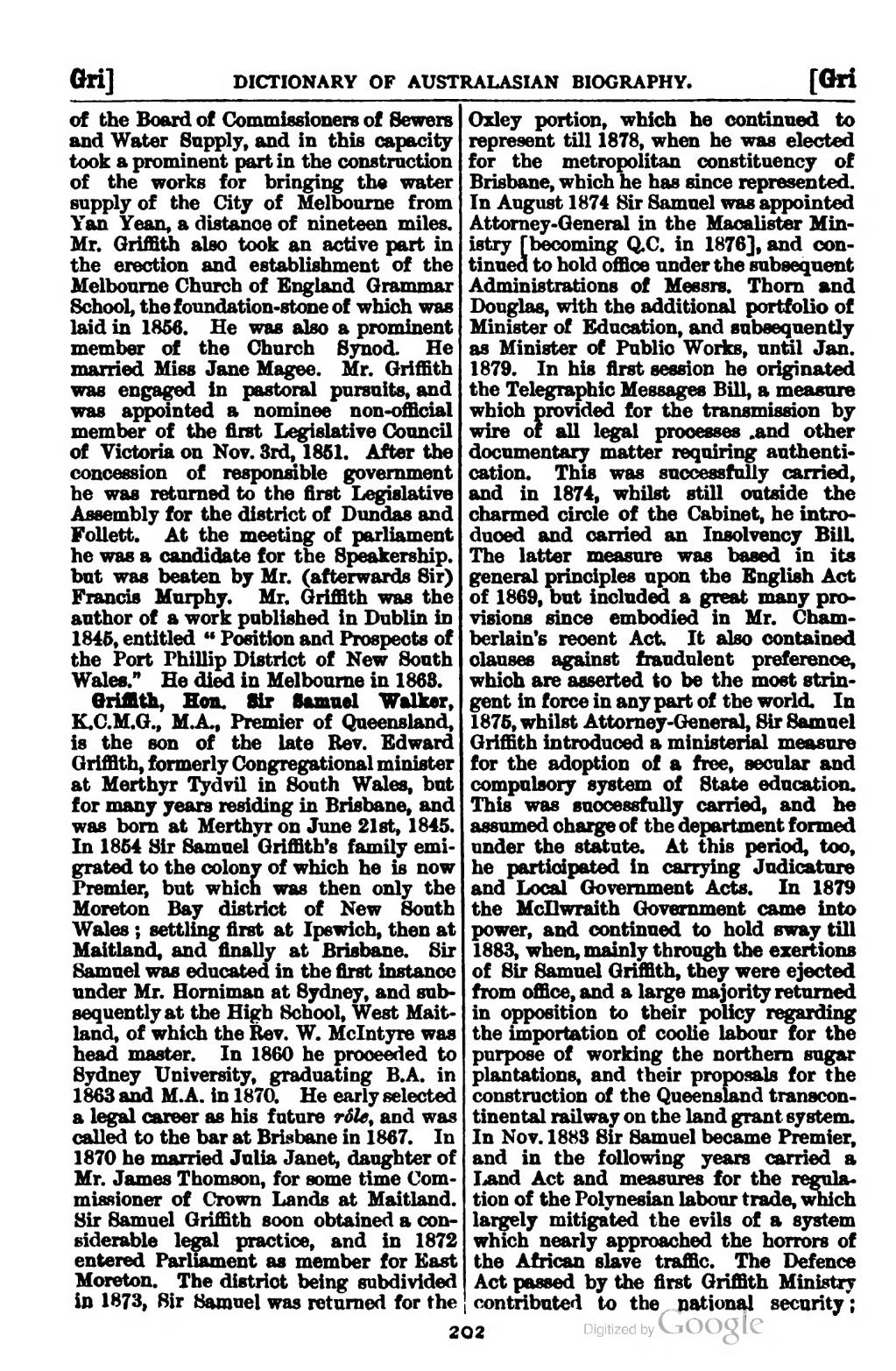of the Board of Commissioners of Sewers and Water Supply, and in this capacity took a prominent part in the construction of the works for bringing the water supply of the City of Melbourne from Yan Yean, a distance of nineteen miles. Mr. Griffith also took an active part in the erection and establishment of the Melbourne Church of England Grammar School, the foundation-stone of which was laid in 1856. He was also a prominent member of the Church Synod. He married Miss Jane Magee. Mr. Griffith was engaged in pastoral pursuits, and was appointed a nominee non-official member of the first Legislative Council of Victoria on Nov. 3rd, 1851. After the concession of responsible government he was returned to the first Legislative Assembly for the district of Dundas and Follett. At the meeting of parliament he was a candidate for the Speakership, but was beaten by Mr. (afterwards Sir) Francis Murphy. Mr. Griffith was the author of a work published in Dublin in 1845, entitled "Position and Prospects of the Port Phillip District of New South Wales." He died in Melbourne in 1863.
Griffith, Hon. Sir Samuel Walker, K.C.M.G., M.A., Premier of Queensland, is the son of the late Rev. Edward Griffith, formerly Congregational minister at Merthyr Tydvil in South Wales, but for many years residing in Brisbane, and was born at Merthyr on June 21st, 1845. In 1854 Sir Samuel Griffith's family emigrated to the colony of which he is now Premier, but which was then only the Moreton Bay district of New South Wales; settling first at Ipswich, then at Maitland, and finally at Brisbane. Sir Samuel was educated in the first instance under Mr. Horniman at Sydney, and subsequently at the High School, West Maitland, of which the Rev. W. McIntyre was head master. In 1860 he proceeded to Sydney University, graduating B.A. in 1863 and M.A. in 1870. He early selected a legal career as his future rôle, and was called to the bar at Brisbane in 1867. In 1870 he married Julia Janet, daughter of Mr. James Thomson, for some time Commissioner of Crown Lands at Maitland. Sir Samuel Griffith soon obtained a considerable legal practice, and in 1872 entered Parliament as member for East Moreton. The district being subdivided in 1873, Sir Samuel was returned for the Oxley portion, which he continued to represent till 1878, when he was elected for the metropolitan constituency of Brisbane, which he has since represented. In August 1874 Sir Samuel was appointed Attorney-General in the Macalister Ministry [becoming Q.C. in 1876], and continued to hold office under the subsequent Administrations of Messrs. Thorn and Douglas, with the additional portfolio of Minister of Education, and subsequently as Minister of Public Works, until Jan. 1879. In his first session he originated the Telegraphic Messages Bill, a measure which provided for the transmission by of all legal processes and other documentary matter requiring authentication. This was successfully carried, and in 1874, whilst still outside the charmed circle of the Cabinet, he introduced and carried an Insolvency Bill. The latter measure was based in its general principles upon the English Act of 1869, but included a great many provisions since embodied in Mr. Chamberlain's recent Act. It also contained clauses against fraudulent preference, which are asserted to be the most stringent in force in any part of the world. In 1875, whilst Attorney-General, Sir Samuel Griffith introduced a ministerial measure for the adoption of a free, secular and compulsory system of State education. This was successfully carried, and he assumed charge of the department formed under the statute. At this period, too, he participated in carrying Judicature and Local Government Acts. In 1879 the McIlwraith Government came into power, and continued to hold sway till 1883, when, mainly through the exertions of Sir Samuel Griffith, they were ejected from office, and a large majority returned in opposition to their policy regarding the importation of coolie labour for the purpose of working the northern sugar plantations, and their proposals for the construction of the Queensland transcontinental railway on the land grant system. In Nov. 1883 Sir Samuel became Premier, and in the following years carried a Land Act and measures for the regulation of the Polynesian labour trade, which largely mitigated the evils of a system which nearly approached the horrors of the African slave traffic. The Defence Act passed by the first Griffith Ministry contributed to the national security;
202
